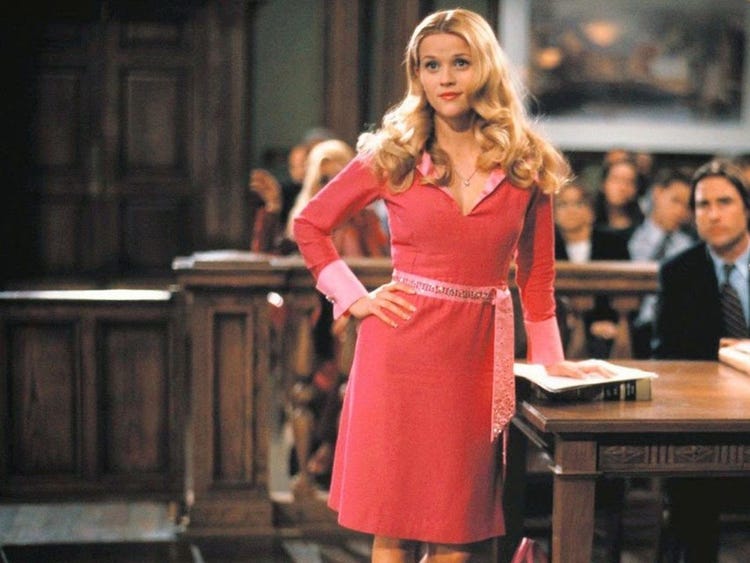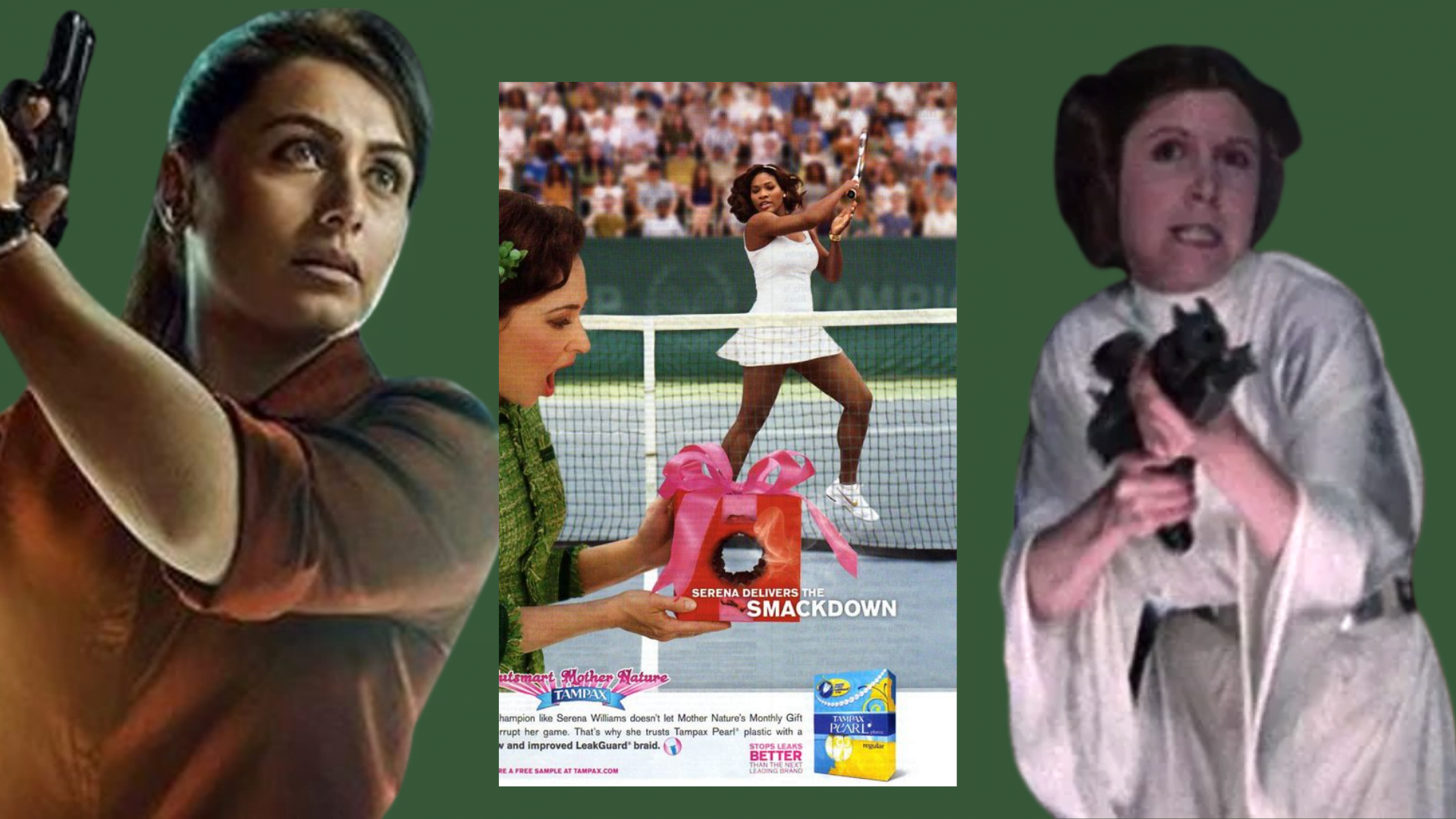Flipping through channels, I came across this advertisement of a sanitary napkin, in which two women are shown doing fieldwork. The weather is warm and in the middle of their fieldwork and interviews, one of the women tells the other to rest because it’s the second day of the latter’s period, who in turn, immediately dismisses her, because apparently she is wearing ‘magic wings’ which helps her ‘reach new heights’. And this took me back to my own ordeal during periods; cramps, nausea, backache, and irritability. Can a sanitary napkin really whoosh all of this away? This notion of ‘girl power’, invisibilisation of pain and overcompensation for natural bodily processes is something that we see in films and pop culture in abundance.
Faux girl power could be seen as a byproduct of pop culture, striving to appeal to absorb feminist ideals and spit them out in a one-dimensional fashion. With one token ‘badass’ character in advertisements, we are expected to cheer for women empowerment.
Faux girl power could be seen as a byproduct of pop culture, striving to appeal to absorb feminist ideals and spit them out in a one-dimensional fashion. With one token ‘badass’ character in advertisements, we are expected to cheer for women empowerment. For example, in many washing powder advertisements, we’ve seen the evolution from women washing clothes to professionals demonstrating to women how to wash clothes. But no matter how tough these ads get, it’s always reinforced that a household chore such as washing clothes is a woman’s job.
Feminism has now evolved to become a hero and an ally, and is no longer seen as a ‘villain’ in pop culture. It’s a globally embraced movement, used by brands to evoke tears and a cathartic release of joy at finally being able to see our ideals and movement represented in pop culture and advertisements. Campaigns like #LikeaGirl #GirlsCan (Dove Soap) uses this popular brand of feminism, the one that’s capitalist-friendly and vocal, yet not too vocal about the kind of changes their product brings to the market. In her 2018 book Empowered: Popular feminism and popular misogyny, feminist media scholar Sarah Banet-Weiser analysed various examples of this popular brand of feminism to highlight that it falls wholly within the logic of neoliberalism, where “ever-expanding markets, entrepreneurialism, a focus on the individual — are embraced, not challenged, by feminism”.
Also read: Japanese Anime: Deconstructing The ‘Strong’ Female Character Tropes
Faux girl power in films can often be ‘masculinised’, as in given a more aggressive touch, because otherwise it ceases to be powerful and fails to pack a punch. For example, in the film ‘Mardaani’, Rani Mukherjee’s character is a tough, no-nonsense inspector, but the title makes it a woman’s empowerment as that aspiring to become like a man. ‘Mardani’ literally means ‘like a man’, or otherwise you’re just not tough enough. Films globally have tried to incorporate this ‘girl power’ trope, an example being every female Avengers scene in Marvel movies, where they band together to take on the villain.

This representation in pop culture and films does nothing to do away with the patriarchal shackles that bind us, instead it reinforces sexism, holding masculinity as the template of empowerment. It certainly isn’t an answer to complex, real women represented on screen. The ‘faux girl power’ trope is also a regurgitation of our wish to embrace a progressive attitude without doing the heavy work. We want it to be flowers and sunshine, when in fact it is a lot of debate, discussions, heated arguments, and things getting ugly after a certain point.
Fortunately, we have films challenging the whole trope too, as early as ‘Legally Blonde’, in which Reese Witherspoon’s character is an intelligent yet nonconformist law student named Elle. Similarly, in Ridley Scott’s ‘Alien’, Sigourney Weaver’s character named Ripley is the only person left alive on a spaceship that’s been taken over by a dangerous alien. She’s terrified but sticks it out, instead of going towards the whole ‘faux girl power’ angle. It is okay, in fact, important for feminist representation to include vulnerability and not just show women as girl bosses who will fight on, no matter what. Vulnerability is what patriarchy abhors, especially in its version of masculinity, and the faux girl power trope plays into the same concept.
It is okay, in fact, important for feminist representation to include vulnerability and not just show women as girl bosses who will fight on, no matter what. Vulnerability is what patriarchy abhors, especially in its version of masculinity, and the faux girl power trope plays into the same concept.

As an audience, what can we do to challenge this trope around us? The first step is to raise our voice and ask uncomfortable questions. Why did you feel that the woman was powerful in so-and-so’s movie? What attributes do you think make her strong? Does our ability to give birth and tolerate bleeding and cramps for four-six days every month make us strong? This involuntary assumption that women are strong because they can tolerate more bodily processes that rip them physically and emotionally does nothing to start a conversation in society about whether women should HAVE to put up a strong face.
Also read: Netflix’s Sir: The Indian Audience’s Fascination With The Rich-Man-Loves-Poor-Girl Trope
The faux girl power trope is in the middle of being completely replaced by complex, layered women characters, both in advertisements and films, but the cathartic joy of seeing ‘seemingly’ strong women onscreen hasn’t waned. Perhaps we need to address this at an individual and societal level, which will lead to better and more effective changes in the larger representation.
About the author(s)
A 23-yr old aspiring recluse who's always looking to superimpose cinema, art, philosophy, writing, and literature on one another. Gulping books and coffee is second nature, the first is cynicism.




